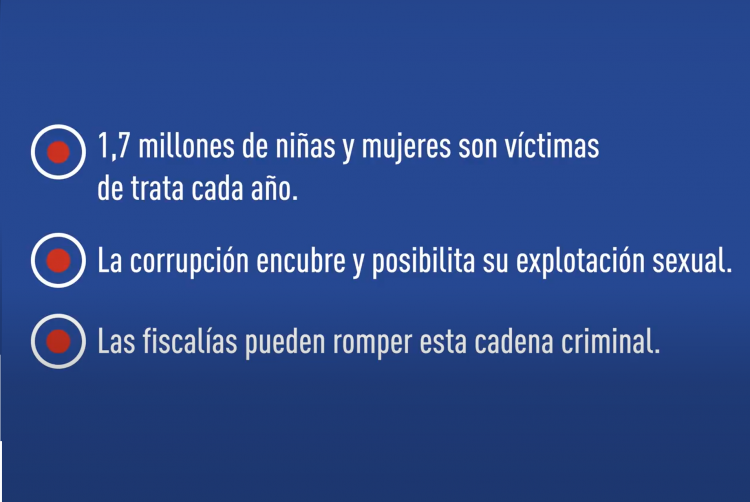The EU Programme for Social Cohesion, through its FIIAPP-coordinated Governance Area and the Ibero-American Association of Public Prosecutor's Offices of Ibero-America, launch a campaign to publicise the corruption that conceals or facilitates trafficking and the ways to combat it.

A corrupt employee who forges an identity document to make a girl appear to be of legal age. A border guard who makes it easy for pimps and their victims to enter a country illegally. A municipal technician who grants a hospitality licence to a brothel. A prosecutor who warns criminal groups before judicial intervention… “the trafficking of girls and women to be sexually exploited would not be possible without the complicity of public employees who look the other way, enable, facilitate, and sometimes even control the activity of criminal trafficking groups. In exchange, they receive regular monetary payments or the possibility of receiving sexual favours from exploited women”, explains Sonia González, Democratic Governance coordinator of the EUROsociAL+ Programme.
“After hard work exchanging experiences, we helped to size up the nature and scope of the problem, positioning the issue on the international agenda and promoting a strategic alliance between prosecutors for trafficking and the fight against corruption within the framework of the Ibero-American Association of Public Prosecutors’ Offices”, added Borja Díaz Rivillas, lead partner in the FIIAPP-coordinated EUROsociAL+ “Women and corruption” initiative.
Anti-corruption investigation, anonymous reporting and whistle-blower protection
“It is essential to foster early involvement in anti-corruption investigations in cases of trafficking in persons that so require it, the strengthening of analysis capacity and the reinforcement of anonymous reporting mechanisms and whistle-blower protection for those reporting such activities. The importance of preventing such corruption and making the risk associated with them more visible is also stressed. Investigation should not confine itself to the bottom of the criminal chain, but rather use analysis tools to detect the links between trafficking, the public authorities and economic powers”, adds González.
#ProsecutorsAgainstCorruptionandHumanTrafficking
This week, the Network of Prosecutors against Corruption and the TRAM Network for Trafficking in Persons and the Smuggling of Migrants (both members of the Ibero-American Association of Public Prosecutor’s Offices (AIAMP), FIIAPP and EUROsociAL+ launched a campaign on social media to raise awareness about specific cases of corruption that facilitate trafficking in Latin America in a series of videos that illustrate the hidden part of the iceberg. AIAMP is an association made up of the Public Prosecutors’ Offices of Andorra, Argentina, Bolivia, Brazil, Chile, Colombia, Costa Rica, Cuba, Ecuador, El Salvador, Spain, Guatemala, Honduras, Mexico, Nicaragua, Panama, Paraguay, Peru, Portugal, the Dominican Republic, Uruguay and Venezuela.
In Latin America, human trafficking is mainly tied in with sexual exploitation: 64% of trafficking cases in the region are for this purpose, a percentage that rises to 81% in Central America. Three out of four victims of trafficking for sexual exploitation are women and girls. Worldwide, 1.7 million women and girls are sexually exploited every year.
Complementarity with the EU-EL PAcCTO programme
Since its inception in 2017, the EL PAcCTO programme has been working to strengthen the coordination and work of the institutions in charge of the fight against human trafficking in Latin America. “Our main focus is on victim protection. Especially when, after discovering the crime, they freely decide to cross a border (for example, to return to their place of origin) and this requires the cross-border transfer protection of the authorities” explains the programme’s Justice Systems coordinator, the prosecutor Antonio Roma.
In Bolivia, PAcCTO has established a multidisciplinary team specialising in human trafficking made up of police and prosecutors that will work together to tackle this crime. A bi-regional network (Europe-Latin America) has also been created, made up of police officers specialised in trafficking in human beings – the LYNX network, comprising ten Latin American and two European countries.




